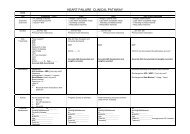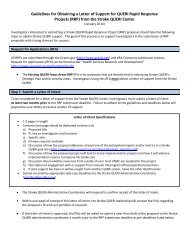The Veteran Supported Education Service Treatment Manual: VetSEd
The Veteran Supported Education Service Treatment Manual: VetSEd
The Veteran Supported Education Service Treatment Manual: VetSEd
You also want an ePaper? Increase the reach of your titles
YUMPU automatically turns print PDFs into web optimized ePapers that Google loves.
Key Elements of Sharing Recovery and <strong>Education</strong>al Stories<br />
Choose when, why, and what you want to share about your mental health<br />
experiences, recovery and educational history in advance when possible. Be<br />
careful not to use your own story as an example every time a <strong>Veteran</strong> is<br />
attempting to make a decision about their life. Doing so can lead the <strong>Veteran</strong> to<br />
think that s/he has to do everything like you did in order to be successful.<br />
Be mindful of who your audience is and focus on sharing aspects of your<br />
recovery and/or educational story that will have the most impact on your<br />
audience members.<br />
Practice telling your stories so that you relate them well and are confident in<br />
what you have to share.<br />
Use clear, simple, everyday direct language.<br />
Be brief and specific about the points you want to make.<br />
Feel free to add humor to your story, but do not use inappropriate or politically<br />
incorrect language or jokes that could offend people.<br />
When you think it will be useful to a person or group, describe the supports,<br />
skills, knowledge, and resources that helped you in your own recovery and/or<br />
pursuit of education.<br />
Your self-disclosure to <strong>Veteran</strong>s has a purpose which is to share hope, share an<br />
example of what helped you, share a point that may help the <strong>Veteran</strong>, and<br />
basically to engage the <strong>Veteran</strong> in his/her own recovery and educational<br />
process.<br />
When sharing your stories with other professionals, your purpose is to dispel<br />
the myths about mental illness (Refer to Appendix H) and reduce stigma by<br />
showing that people with mental illnesses are able to work, play, live, grow,<br />
learn and achieve educational goals like anyone else!<br />
Always keep in mind that your self-disclosure is to benefit others, not yourself.<br />
Do not let your story remain focused on you. As quickly as possible, shift the<br />
focus from your story back to the <strong>Veteran</strong> with whom you are working. You<br />
are an example, not an exhibit!<br />
86 | P a g e
















